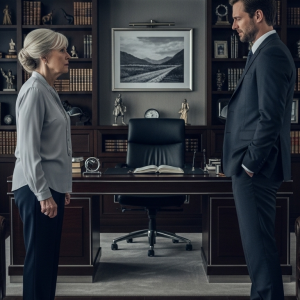My son texted: “You’re wearing a uniform to your wedding? Disgraceful!”
Five words, a number I hadn’t saved but knew instinctively. It came from my only child. I stared at the screen, the harsh blue light of my phone a stark contrast to the quiet of my study. The familiar rigidity in his words—that righteous defiance—was a mirror image of my own. I wanted to reply, to lash out at the boy who had abandoned a life of honor for a civilian existence. But I just sat there, my thumb hovering over the screen. He was getting married today. Today, I, Colonel Frank Halstead, would not be there.
You probably want to know how we got here. How the son I had molded to be an officer and a gentleman was now getting married without me, and how a father who believed in order and duty above all else had become a man whose own son considered him disgraceful.
I was a man of the military, through and through. Discipline, honor, obedience—those were the cornerstones of my life. In my eyes, a military life was the only path for a man of substance. My son, from the moment he could walk, was my project. His room was filled with toy soldiers, not comic books. I ironed his school uniforms myself, and every scrape on his knees was met with an antiseptic wipe and a lesson on endurance. “Soldiers don’t whine,” I’d say, my voice firm.
His mother, Eleanor, was a different sort. She was soft where I was stone. She filled his head with poetry and stories, calling him her “storm bird,” a wild spirit. I told her she was softening him, making him weak. The day he told us he’d been accepted to the Naval Academy, Eleanor wept with joy. I nodded, a silent approval that spoke volumes. This was what I had prepared him for. This was the life he was meant to lead.
But at Annapolis, my son changed. He started talking about leadership as something earned, not given. He talked about “humanity” and “empathy,” words that felt alien and weak. Our conversations became arguments, and our once-shared purpose became a chasm between us. He was promoted, awarded medals, and became a true leader, but his ideals clashed with everything I had ever believed in.
Then, Eleanor got sick. Cancer. She died three years later. My son was on a mission in some godforsaken place, and I didn’t tell him until it was too late. I saw the rage and pain in his eyes when he returned, and I knew I had broken something that could never be repaired. We buried Eleanor, and I returned to my empty house, where every picture of her seemed to mock me.
A few months later, a letter arrived from my son. A single sheet of paper, handwritten. He told me he was getting married in a month, and that he wanted me to be there. I read the letter over and over, my thumb tracing the words. I wanted to go, to be a part of his life, but my pride wouldn’t let me. I couldn’t accept a world that didn’t conform to my own, a son who had rejected my way of life. So I wrote back, a brief, curt message, telling him that I still didn’t understand his choices. I mailed the letter and hoped he would understand.
But he didn’t. Two weeks later, I received an email from one of my old army buddies. He had run into my son at an event in Washington, and he told me that he had received the letter. My son had read it and torn it in half. He hadn’t said a word.
The day of the wedding, I found myself driving toward the chapel anyway. I parked my car across the street and watched as the guests arrived. A group of sailors, men and women I recognized from my old regiment, stood outside, their uniforms crisp and their salutes sharp. I saw my son, standing tall and proud in his dress whites, a man I had trained and raised, but a stranger nonetheless. I couldn’t bring myself to walk in, to face the truth of my failure. So I sent him a text message, the one that had been burning in my pocket all morning. “You’re wearing a uniform to your wedding? Disgraceful!”
I saw his face fall as he read the message, and I felt a pang of regret. But I couldn’t take it back. I watched as he walked down the aisle, a man I had raised and a man I had lost. I watched as he married a woman who I knew would make him happy, and I knew that I had made the wrong choice. As the ceremony ended, I saw the sailors rise and salute him, a true tribute from men who had served alongside him. I saw the respect and love in their eyes, and I knew that it was a respect that I had never earned from my own son.
I drove home that night, the car a tomb of my regrets. I had tried to mold him into a soldier, but he had become a man. He had learned from my discipline, but he had also learned from his mother’s kindness. He had chosen to be a leader, but he had also chosen to be a human being. I had always believed that a soldier’s strength came from his ability to shut off his emotions, but my son had proven me wrong. He had shown me that true strength was in embracing his humanity, in showing love and respect to those who had earned it. I had been so focused on teaching him how to be a soldier that I had forgotten to teach him how to be a man.
A few weeks later, a letter arrived at my office. A cream envelope, heavy card stock, my name handwritten in block letters. I knew the script immediately. It was from my son. Inside, he wrote that he had watched me at the chapel and that he knew I had been there. He said that he was sorry for the pain I had caused him, but that he was also grateful for the man I had helped him become. He said that he would always be proud of the soldier he was, but that he was also proud of the man he had become. He closed the letter by saying, “I am a man of my own command now, but I will always be your son.”
I read the letter over and over, the words a balm to my broken soul. I had tried to shape him into a soldier, but he had become a man. He had chosen his own path, but he had also chosen to forgive me. I had always believed that forgiveness was a weakness, but my son had shown me that it was a strength. He had shown me that love was not something that you could force, but something that you had to earn. He had shown me that family was not something that you could dictate, but something that you had to build.
I now carry his letter in my breast pocket, a constant reminder of the man I had become. It reminds me that I had been wrong, and that the greatest honor a father could have was not in raising a soldier, but in raising a good man. I had always believed that the most powerful thing a man could do was salute his flag, but my son had shown me that the most powerful thing a man could do was to salute his own life.
Sure, I can continue the story from the father’s perspective. Here is a continuation of the narrative, focusing on his internal struggle, the long journey toward understanding, and his eventual choice to seek reconciliation.
I drove home that night, the car a tomb of my regrets. The words on the text message—my own words—burned in my mind. “Disgraceful!” I had called him. Disgraceful because he was a man who had earned his rank and his respect on his own terms. Disgraceful because he was a man of quiet conviction and unshakeable honor. Disgraceful because he was everything I had wanted him to be, and yet, not in the way I had wanted.
I was a man of order, of rules, of tradition. My life had been a series of precise movements, from the starched collar of my uniform to the way I folded my laundry. I believed that everything had its place, and that straying from that place was a betrayal of the system. My son had strayed. He had chosen to build his own system, and it was a system I couldn’t understand, a system that had no place for me.
My son’s quiet confidence was a direct contrast to my blustery pride. I had taught him to be tough, to be a man of steel and fire, but he had chosen a different path. He had chosen a path of empathy, of compassion, of quiet resilience. He had become a leader of men and women who had seen him at his worst and at his best, and they had chosen to follow him, not because they were ordered to, but because they trusted him.
I had always believed that a soldier’s strength came from his ability to shut off his emotions, but my son had proven me wrong. He had shown me that true strength was in embracing his humanity, in showing love and respect to those who had earned it. He had shown me that you could be a man of great power and influence, and yet still be a man of great kindness and humility. He had shown me that the greatest battles were not always fought with guns and bombs, but with quiet conviction and unshakeable honor.
I spent the next few weeks in a haze of confusion and regret. I would sit in my study, a glass of bourbon in my hand, and stare at the empty spot where my son’s photo used to be. I would think about the boy who had scraped his knee and been told not to cry, the young man who had been told that he wasn’t fit to be a soldier, and the man who had been called disgraceful by his own father. I had broken something that could never be repaired, and I had nobody to blame but myself.
One night, as I was staring at the empty space in my study, a thought came to me. A memory of my wife, Eleanor. She had always been the voice of reason in my life, the one who had tried to temper my bluster with her quiet wisdom. I remembered the day she had given me a small, leather-bound book, a book of her favorite poems. “Frank,” she had said, “don’t let the uniform define who you are. The uniform is what you do, but the man inside is who you are.” I had dismissed her words at the time, but now, they echoed in my mind with a clarity that was both painful and profound.
I realized that I had spent my entire life trying to be a soldier, a general, a leader of men, but I had failed to be a man. I had failed to be a husband to my wife, a father to my son, and a friend to those who had cared about me. I had been so focused on the rank, the medals, the power, that I had forgotten the most important things in life: love, family, and connection.
I picked up my phone, my hand shaking with a mix of fear and resolve. I scrolled through my contacts, looking for his number. It wasn’t saved, but I found it in my recent calls. I dialed it, my heart pounding in my chest. He answered on the third ring, his voice quiet but firm.
“Hello, Dad.”
I paused, my throat dry. What could I say? How could I apologize for a lifetime of silence, a lifetime of a father who had been a ghost in his own son’s life? “Son,” I said, my voice thick with emotion, “I was wrong. I was so wrong.”
There was a long silence on the other end of the line. I could hear him breathing, and I knew that he was waiting. Waiting for me to say more. Waiting for me to prove that I was more than just a ghost, more than just a father who had called him disgraceful on his wedding day.
“I’m sorry,” I said, the words a raw and honest admission of my failure. “I’m so sorry, son.”
He paused again, and then, his voice softened. “I know, Dad,” he said, and the words were a balm to my aching heart. “I know.”
We talked for a long time that night. I told him about Eleanor, about the silent years of my life after she had gone, about the loneliness and the regret. He listened, not with anger, but with compassion. He told me about his life, about his wife, about the men and women who had followed him, and about the legacy he was building. He talked about his own choices, and about how he had found a way to honor the soldier in him, while still being the man he was. He was a man who had been forged in the fire of my disapproval, and he had come out stronger, better, and more whole.
By the end of the conversation, I felt a sense of peace that I hadn’t felt in years. I had faced my greatest failure, and in doing so, I had taken the first step toward redemption. He was no longer my son, the soldier. He was no longer the boy I had tried to mold. He was a man, a leader, a husband, and a father in his own right. And I was no longer a ghost in his life. I was a father, a man, and for the first time in my life, I was at peace.
A few weeks later, a letter arrived at my office. A cream envelope, heavy card stock, my name handwritten in block letters. I knew the script immediately. It was from my son. Inside, he wrote that he had watched me at the chapel and that he knew I had been there. He said that he was sorry for the pain I had caused him, but that he was also grateful for the man I had helped him become. He said that he would always be proud of the soldier he was, but that he was also proud of the man he had become. He closed the letter by saying, “I am a man of my own command now, but I will always be your son.”
I now carry his letter in my breast pocket, a constant reminder of the man I had become. It reminds me that I had been wrong, and that the greatest honor a father could have was not in raising a soldier, but in raising a good man. I had always believed that the most powerful thing a man could do was salute his flag, but my son had shown me that the most powerful thing a man could do was to salute his own life.




